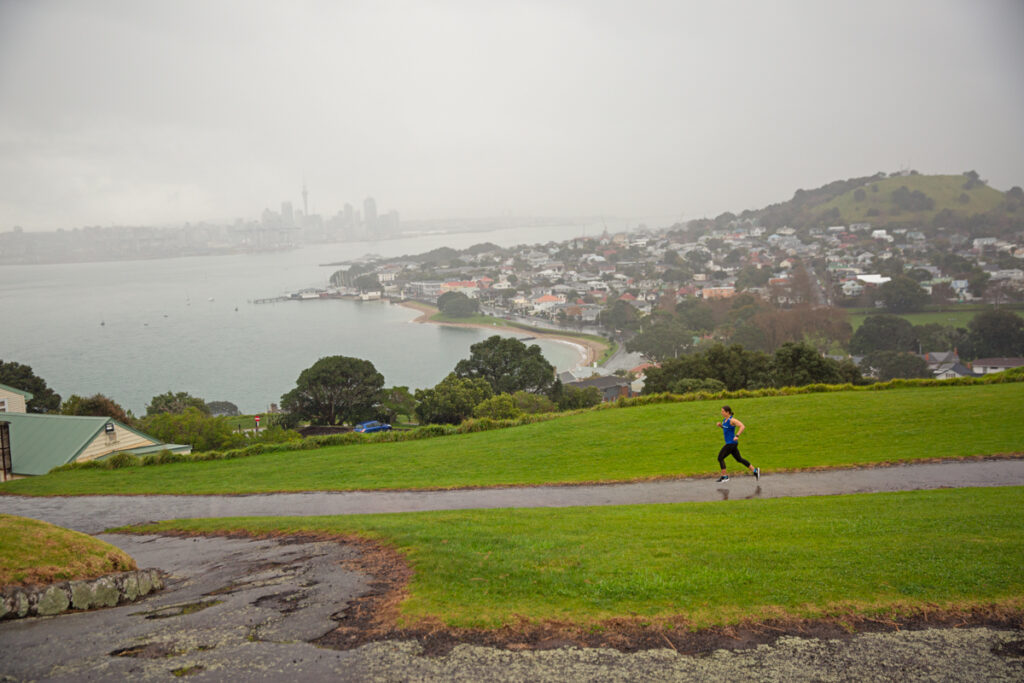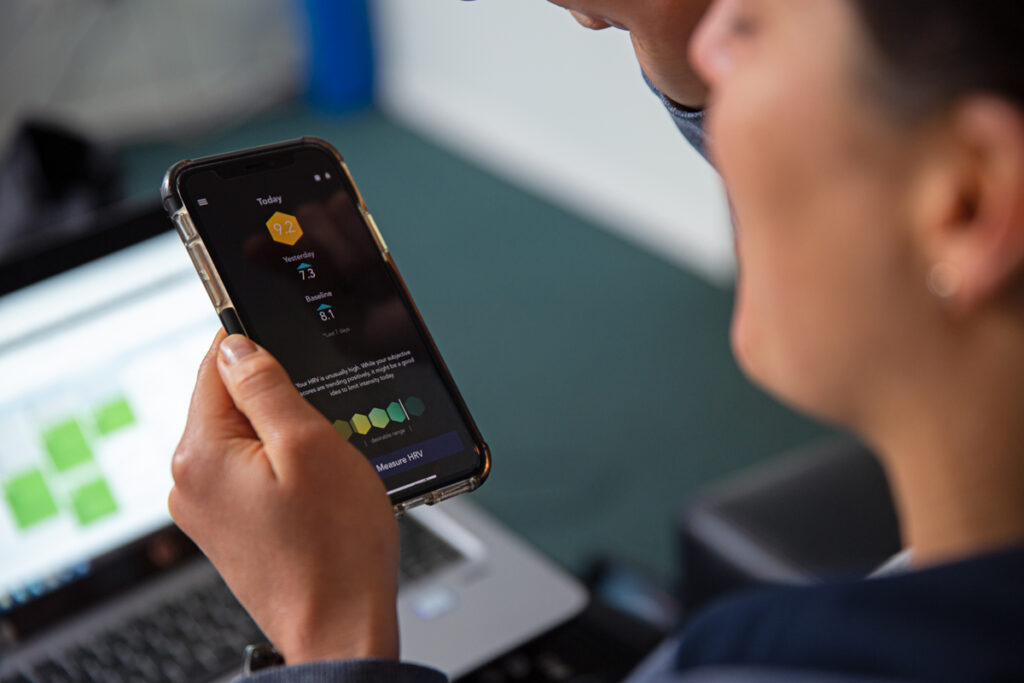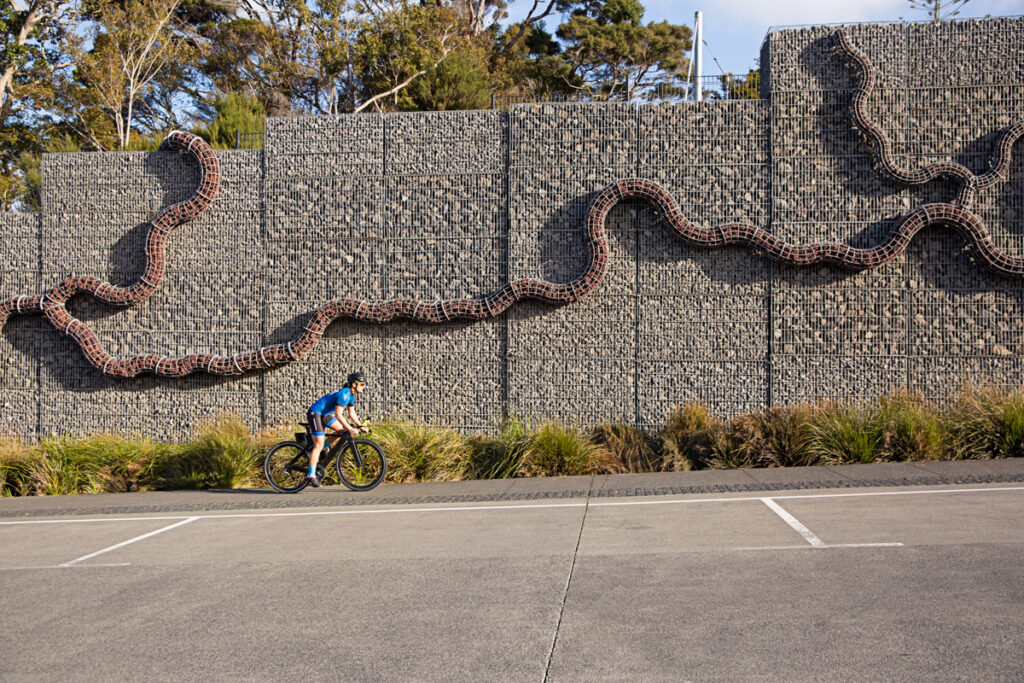Claire Badenhorst is a triathlete and a researcher at Massey University in Auckland, New Zealand. She did her undergraduate degree in sports science, exercise and health, and followed that through into a Ph.D. She recently moved (in 2017) from Perth, Australia, to New Zealand to be a lecturer at Massey University, which she loves.
TrainingPeaks: Tell us about your background in triathlon and physiology research.
Claire Badenhorst: I’ve got a background (and research interest) in iron deficiency in endurance athletes, with a focus on female health and female performance. What works for one woman won’t necessarily work for another, and it’s that not knowing that’s sort of driven that passion area for me.
When comes to my own sports, I’ve got no hand-eye coordination; that whole skillset is lost on me somehow, so I did rowing and running and that kind of stuff through school. But once you leave school you also leave that culture where you’ve got this very structured life. I started going to the gym and I just got really bored really quickly, so my family suggested that I try a triathlon. I borrowed my brother’s bike and tried one, and that was it. I was addicted almost straight away.

It’s been an interesting couple of years. I’ve basically progressed from this newbie who had no idea how to ride a bike, to having it be a major part of my life. I started small with a sprint and then an Olympic distance triathlon, and then five years ago stepped up to my first half IM, and after that (in 2018) I finally did my first IM. The more I do it, the more I enjoy it, especially those long-distance ones (the half and the IM).
Sports are just something that I’ve always done. Training isn’t just routine for me—sometimes it’s the most relaxing part of my day.
Is your research in iron deficiency driven by personal experience?
Yes. I was first diagnosed with iron deficiency when I was quite young, like 10 or 11 years old. My swim coach picked it up because I went from being quite good to not improving, and I also just looked fatigued and pale, almost yellow. I’ve got olive skin so when I go pale I look like I’ve got jaundice on my face. They sent me off for a few blood tests, and sure enough, I was Iron deficient.
I think that learning about and experiencing iron deficiency while I was quite young was actually really valuable. As I was growing up and getting more involved in sport, I would get bouts of iron deficiency; it would almost happen in waves. It’s gotten to the point that I basically know when I wake up if I haven’t gotten it right like if I haven’t gotten iron tablets or taken them at the right time, I just know the feeling of being deficient.
What’s that like?
It’s not like, “Ah, I haven’t had enough sleep,” it’s complete fatigue where you just lie there and think “I don’t know how to move right now, I want to get up and move but my body just won’t.” I’ve talked to so many females about it, and they think they’re just busy and tired, and it almost upsets me: you’re meant to feel good. Feeling tired all the time is not a normal state. Feeling good and healthy and able to cope with life—that’s normal.
I’ve talked to so many females about it, and they think they’re just busy and tired, and it almost upsets me: you’re meant to feel good. Feeling tired all the time is not a normal state.

How does that knowledge affect your research?
If someone I know is prone to iron deficiency or is a normally menstruating female, I’ll often ask them to ask for a full iron scan when they get their blood levels, including their red cell count.
I feel like it’s something that needs to be done probably quarterly as a female, just to make sure you’re ok. Your red blood cells turn over around every three months, so you can actually pick up quite well how your body’s doing in that phase. For young, healthy females who have a normal menstrual period, every three months is good—and guys who know they tend to be iron deficient should follow that same schedule. If you’ve never suffered from iron deficiency but you are doing endurance sports, probably twice a year would be fine.
What other biomarkers do you look for in athletes?
It’s always good to do a whole body screen, even at the best of times. I suggest having a look at your full blood counts, so you get your red blood cells, your hemoglobin, and your white blood cell count. I’d look at iron and all the variables (vitamins and minerals) associated with that, and I’d probably also look at reproductive and thyroid hormones too.
Another one is C-reactive protein. If that’s quite high it could be the case that your system is in quite a bit of stress. We see athletes who have high markers of C-reactive protein are more at risk of overtraining.
One of the key things for me is that your health needs to come first, before your training. You can train and train and keep smashing yourself—the power the brain has over the rest of your body is quite good—but there comes a point where a healthier person is going to excel in their training more than you. If your physiology is not healthy, you’re not going to adapt to whatever stress you put yourself under.
If your physiology is not healthy, you’re not going to adapt to whatever stress you put yourself under.

Are there metrics you use on TrainingPeaks or WKO to indicate overtraining or declining health?
What I really like about TP is that you can upload all your bloodwork, HRV, workouts and feedback—and track it all together. It’s a real-time tracking system of my health, alongside my training performances.
I’ve actually learned a lot about myself through TrainingPeaks. For example, when I’m not sleeping very well I can almost pick up when I’m gonna get sick—and then I’m running to the pharmacy because there are a few things that always work for me. Being able to bypass a few colds and touches of flu before they happen has really helped me stay consistent with my training.
It’s just such a dynamic platform to work with. You can look back for years and actually see your progress, which is helpful on those workouts when you’re like, “Oh my goodness, nothing is working!” Looking back can really help put it all in perspective, which makes it easier to deal with a bad day. Especially for us type-A people—the data says I’m ok, so I’m ok!
What are your goals for this year?
For 2019 I’m focusing on a couple of key triathlons. Taupo 70.3 at the end of the year and Ironman New Zealand in March 2020 are the big ones. I also really want to race at worlds in New Zealand in 2020, so those are probably my two to three key triathlon races. I’d like to attempt some personal best in terms of times, and so for IM that would mean going probably around the ten-hour mark if I’ve had a good day? Which would be quite nice!
I also have a bit of a personal goal that I have been really working on in my running training—I’ve always seemed to somehow get a little bit of a niggle that sometimes results in a couple of weeks off of running. It hasn’t happened every year, but my goal this year is to see if I can get 12 months without having one of those injury-enforced running breaks.
TrainingPeaks is just such a dynamic platform to work with. You can look back for years and actually see your progress.

What steps are you taking to prevent that?
I often joke with my coach in that I’ve got an athlete brain and an academic brain. My academic brain knows exactly what I’m doing, but my athlete brain is very irrational. I’ve known rationally that I need to do most of my run training in that low aerobic zone, but my athlete brain is paranoid and likes to run hard. I tend to get stuck in that moderately high-intensity grey zone, which doesn’t allow you to run any quicker because you’re always fatigued. In previous years this is how I have broken myself down quite badly.
I’ve had to put myself on quite a tight leash, which is supported by my coach and physio. I’ve been learning that it’s okay to run slow, and I’m finding that my body is responding to that quite well. It’s actually really funny, when I get those easy runs, the description from my coach is like, “Easy run. Run incredibly slow. Best done alone… like embarrassingly slow.” And I’m like, “Alright, casual jog!”
That’s why I think having a coach is so important. I mean, I’ve been studying sports science for almost ten years and I still needed to be told to actually listen to what I tell other people to do. I think it’s so valuable to have someone to keep you accountable.

Does it help to have all your files and everything there to prove it to yourself and your coach?
Definitely, I have power meters and HRM’s and things like that, so I know when I’ve done an easier run right and I know when I’ve done it wrong because the scientist in me will always open the file. I always know when I’m gonna get a message being like, “do you really think that was easy?”
There should be an option for your coach to change the color of the box if you do it too hard, right?
That would be brilliant! No green box for you! Or maybe it’s like a really ugly color like brown like you’re doing a crap job; you did not do this one well. I think my coach would have a field day with that one!
Can you talk a little about how you balance your work and training?
I’ve been doing my training for so long that it has just become something that I do. Initially, when I was younger, it was almost how I defined myself, but of course, you evolve and develop other facets of your life, and then it just becomes something that you do. This week for example has been quite busy for me, and the most relaxing part has actually been my training.
To get everything done I’m up at around 4:30 AM. I start training by 5:30, and I’m done usually by 7. Every night when I make dinner I make my breakfast and lunch too, so it’s all packed up in containers and ready to go for the next day. I just grab it all after training and head straight to work.
When I get home I do another workout, have some dinner, and maybe finish up with a couple of things with work that needs to be tied up at night. I make sure I go to bed around 9-9:30 p.m. so I can start again. Yes, there are times when it’s busy and hard, but it’s something I love to do, and it makes me feel good, so I’m going to try to figure out a way to do it all. I just try to be as systematic and consistent as possible.
That’s why I think having a coach is so important. I mean, I’ve been studying sports science for almost ten years and I still needed to be told to actually listen to what I tell other people to do.

How do you use TrainingPeaks to manage your time?
TrainingPeaks is the first thing I open up every day to see what I need to do, and what my day is gonna look like, training-wise. Then I build in work and build in life after that. I think that doing it in those three stages allows me to maximize my time.
Once you get your program put in there, it’s really nice to see when you open it up: this is what I need to do today. My run usually becomes my lunch break! Or if I can see a very easy ride, sometimes I’ll leave that one to the afternoon or evening, maybe go home from work at about 4:00, and I’ll answer emails while I ride inside.
How many hours a week do you train?
It really depends, usually anywhere between 15-18? That allows me to get all my work done, and all my training. I feel good and still get to have a social life. In that sense I think that the longer you’re in the game the more you realize you need to have those other facets in your life.

What’s the most rewarding thing about this level of training for you?
I just love seeing what my body is capable of, and training allows me to do that. It’s a bit of a self-experimentation in that sense. I know extreme exercise and triathlon training aren’t for everyone, but every day I learn that there’s not a boundary. If you’re looking after yourself and generally taking care of your health and physiology, you can actually push your ceiling further and further.
I just think so many people just under-utilize what they have, and if they just tried something outside their comfort zone, they would be amazed at what the human body can do. It’s an amazing machine. Simplistic in some ways, for sure, but incredible in others.
For me it’s incredibly humbling, everyone wants to be good, but even the elites are still learning. It’s always progress, there’s never a before and after, there’s just before and improving. It’s a self-experiment that can just go on forever!







